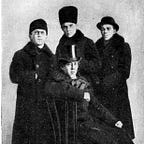They Said: On La Leyenda De La Mala Lengua; or Stranger in a Stranger Land
Insofar as memory serves as a reference for self preservation, maintaining one’s safety, its dependence can lead to rancid cultural dogma. Can dogma be artificially fine tuned to best preserve a perpetual foundation for our own realization without the risk of becoming a slave to it? The perpetual foundation doesn’t have to be consistent but always provide the opportunity for a better foundation. The foundation crawls towards something by the participants; the participants pulling their surrounding towards the foundation through their recollection. A recursion where the act of the citizens is focused towards the state so that the state can be the foundation for an ever improving citizen.
Groups depending on consistent references (eg the Bible) modulate at a slower pace. At the foundation, references stop moving altogether and the individual becomes a stone statue to societal expectations. There is no curiosity or looking for alternatives, perhaps better, solutions. Only a dignified repose to show for our work in keeping the tribe alive.
Although the logic is ill-fitting At time, we pull and wear the traditional garment of going towards what we “know” or what we can count on. No doubt correlated mental states that deal with going back to a better mental state. Seeing as the future isn’t promised, habits are reiterations that hold us in their breasts.
If we entertain a creation-centered ontology, we have to flesh out the essence of creation from its remnants within our experience. From the experience we produce epistemic notation that measure and define moving parts of creation. The process runs like a machine and the ghost inside is self evident. The spirit presents itself by feeling the weigh and burden of creation, the responsibility that drapes a reaffirmation over the created. A reaffirmation that takes its heaviness from vulnerability and a recognition of the possibility of destruction.
An example are scientists at the moment that feel the need to get political because the alt-right is forcing neutral people to act. This event is significant because the scientist gains another dimension that forces and grows the boundaries once a scientist becomes a scientist with political opinions. Obviously a scientist always has policial opinions but it’s separate from the scientific work; to revitalize the scientist itself within a political context makes the scientists more responsible for unscientific conclusions (ie political ideology) within their scientific work. The recursive nourishment for the state becomes complex.
There’s a risk of bias but the risk is taken to safeguard the living, moving science from the alt-right. The scientist creates an existential tight rope walk, or a leap of faith, to accomplish the feat of science while struggling with political ideology. The scientist without political weigh just carries out the scientific method to its fated conclusion. Without political struggle, the actions of this scientist ends with a possibility that exist without scientific doubt but is also politically agnostic. While the political scientist produces work that needs nuance to interpret. The nuance itself being a filter for possibility that is less agnostic and more moral. The nuance itself being a struggle that leads towards science without bias but also a science that cannot be weaponized against others or risk the state that defends the dignity of all citizens.
